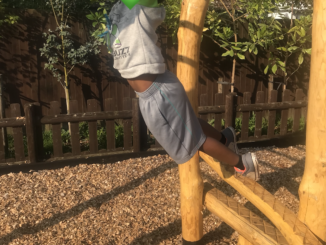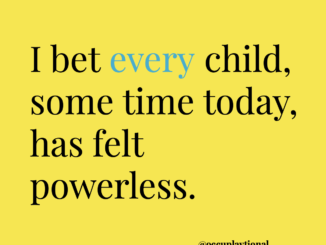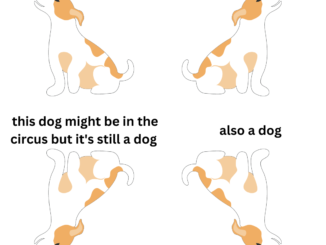It’s really understandable why adults ask children “Why did you do that?”
After all, children are constantly doing things that seem honestly incomprehensible if not outright bonkers.
An interesting side note is that in my job role, I am often assigned to stand in a set place and watch a particular child for a long period of time at school—maybe even an hour. I will often see the child do things that would truly seem incomprehensible to the adult who is in charge, who is interacting with 20 students at once and only able to give this particular child 1/20th of their attention. But me, giving them 100% of my silent attention (but not adult support—they don’t know I’m there to observe them) can usually figure out what it is they meant to do, or were going for, or intended. It almost always has a reason that does actually make sense! Just was based on child logic, or was reacting to an unexpected situation, or didn’t understand the initial directions, or whatever. But that’s actually not what I’m here to talk about—so back to the point.
Asking children “why did you do that?” when they’re younger than about five-ish (on average) is not a reliable source of information. This is important to know because children will often still answer the question. The answers they give might be alarming, or unhelpful, or factually untrue, or seemingly sociopathic!
“Why did you hit her?”
-I didn’t.
-She hit me first. (She actually did not.)
-Because I like to hit people.
-I don’t know.
-She is mean to me.
-Um um um, she…um um um, she…um…she…um um…she…um… (by which point you’ve gotten annoyed and moved on to whatever you were going to say next anyway)
Children under this age literally do not know why they did something. An impulse entered their brain and they did it. That doesn’t mean that they can only go around doing incomprehensible things but it does mean that they aren’t acting on a body of measured forward thinking.
Even when they do something that looks like “they knew what they were doing”, like when they track someone down to hit them who wronged them versus just instinctually whacking them the next millisecond, that still doesn’t mean that there was metacognition — thinking about their thinking — involved. It doesn’t mean that they weighed all available options and figured out that the best one was Seek Revenge. It just means that they were able to hold the same thought without getting distracted for a longer amount of time, but that doesn’t mean that they could verbalise exactly what that thought process is or be capable of reflecting back to figure out what it *was* after the fact.
Asking children “why did you do that?” when they are older than about five-ish (on average) is STILL not a reliable source of information, but in a different way. You might end up getting reasons that sound like excuses or justifications. Or they might still have mindlessly followed an impulse and not have any way to explain what it is that they were doing, because it wasn’t a considered action, it was still just an impulse. Or, just like with younger children, their brain might try to make up a reason…but end up accidentally making up a completely incorrect reason to explain whatever the action was.
Recently my husband finished his doctorate program (shout out to Dr. Mr. The Occuplaytional Therapist!) He told me at the end of that week that he had been drinking 2-3 sodas every day where he usually tries to just drink 1. In his own mind, he had justified it as, “I’m just celebrating because I finished my doctorate.” Then, when he went to pour himself water from the water pitcher, he realised the filter needed to be changed—and had all week! His body could sense the difference in the water and disliked it, but because he hadn’t become aware of the filter needing changed yet, he started meeting his interoceptive needs to quench his thirst by drinking extra soda. And then he retroactively made up an explanation that made sense—“I’m celebrating”—without even knowing that that reason wasn’t the actual reason.
It’s really understandable why adults ask children “Why did you do that”, but it’s not necessarily helpful for adults to ask. Honestly, if adults genuinely want to know what a child’s reason was for something, there’s a couple of better ways to go about that. One is to observe them in the situation where the thing happened (assuming it wasn’t just a random inexplicable one-off that you’re curious about). This is good for any age, young children or older children. Like I mentioned in my aside above, watching one particular child interact with other kids, or participate in class, or do things at home, or whatever, you do usually see more explaining their logic than you might expect to see.
The other way, that only works with older kids, is to talk to them about it—but not by demanding “why did you do that??” in the wake of whatever the thing was. Instead, at a time when everybody is calm and regulated, you could ask, “Hey, i noticed that earlier you ______. What’s up?” This model of collaboratively problem solving with the child is detailed in all of Dr. Ross Greene’s work. He has books — The Explosive Child; Raising Human Beings; Lost at School. He has YouTube videos where he talks about the method. He has an extensive website and a FB group called “The B Team” dedicated to helping parents walk through this method.
In this method, you still wouldn’t ask a child, “I noticed that earlier you hit your sister…” but rather, be talking about whatever the expectation or environment was at the time when the action (or “behavior”, I hate that word) occurred. “I noticed that earlier something went wrong when you were playing in the living room with your sister! Do you remember what happened?” If you lead with “I noticed that you hit her,” you’re leading with, “Give me an excuse or a justification” again, just like asking “Why” in the moment would be.



